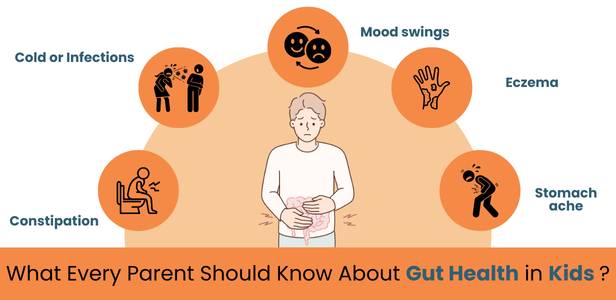What Every Parent Should Know About Gut Health in Kids
- By Dr Jyati

A healthy gut is key to your child’s overall well-being.
It affects digestion, immune strength, mental focus, and even mood. Many parents overlook the importance of the gut microbiome—trillions of good bacteria that live in the digestive tract.
Let’s break down why gut health is so important and what parents can do to protect it.
Why Gut Health Matters for Children
The gut does more than just digest food.
It’s home to 70% of the body’s immune cells and plays a key role in nutrient absorption, inflammation control, and brain development.
Here’s why gut health is vital in growing children:
- Stronger Immunity: A well-balanced gut can help fight infections and allergies.
- Better Digestion: Children with a healthy gut absorb nutrients better, helping growth.
- Mood and Behavior: The gut and brain are connected. An imbalanced gut can affect mood, sleep, and behavior.
- Reduced Inflammation: Poor gut health can lead to chronic inflammation and health issues later in life.
A healthy gut supports every aspect of a child's development.
Starting young helps build a strong foundation for lifelong health.
Signs of Poor Gut Health in Kids
Knowing what to look for can help parents take early action.
Common signs include:
- Frequent stomach aches or gas
- Constipation or diarrhea
- Poor appetite or picky eating
- Frequent colds or infections
- Skin issues like eczema
- Bad breath even after brushing
- Mood swings, irritability, or trouble sleeping
If you notice several of these signs regularly, it may point to an imbalance in your child’s gut bacteria.
Addressing the gut can often improve these issues naturally—without medications.
Best Foods to Support Gut Health in Children
Food directly influences gut bacteria.
Here are the best gut-friendly foods for kids:
Fiber-Rich Foods:
- Bananas
- Apples with skin
- Carrots
- Whole grains
- Oats
Fiber feeds good bacteria and keeps digestion regular.
Fermented Foods (for older children):
- Yogurt with live cultures
- Buttermilk
- Homemade pickles
- Idli or dosa (fermented batter)
These introduce healthy bacteria into the gut.
Prebiotic Foods:
- Garlic
- Onions
- Leeks
- Asparagus
These feed the probiotics, helping them grow.
Avoid too much sugar, processed food, and artificial additives—they harm gut bacteria.
Probiotics and Prebiotics for Kids
Probiotics are good bacteria. Prebiotics are food for them.
Giving both supports a thriving gut environment.
Child-Friendly Probiotics:
- Yogurt with “live cultures”
- Probiotic drops or chewables (consult your pediatrician)
- Kefir (for older kids)
Natural Prebiotics:
- Fruits like apples, berries
- Veggies like broccoli, spinach
- Oats and whole grains
Avoid giving supplements without medical advice.
Instead, focus on getting probiotics and prebiotics through food.
Tips for Maintaining a Healthy Gut in Children
Small changes can make a big difference.
Try these simple tips:
- Balanced meals: Include fruits, vegetables, whole grains, and fermented foods.
- Limit sugar: Sugar feeds bad bacteria and causes imbalance.
- Stay active: Exercise helps digestion and gut function.
- Encourage outdoor play: Dirt and nature expose kids to helpful microbes.
- Hydration: Water supports digestion and prevents constipation.
- Avoid overuse of antibiotics: They kill good and bad bacteria. Use only when needed.
Gut health is a daily habit, not a one-time fix.
Consistency is key.
FAQs
1. Can gut health affect my child’s behavior?
Yes. The gut-brain connection influences mood, attention, and sleep. An imbalanced gut may lead to irritability or sleep problems.
2. Are probiotics safe for kids?
Mostly yes. Natural sources like yogurt are safe. Supplements should be given only after talking to a doctor.
3. How do I know if my child needs gut support?
Look for signs like frequent tummy aches, allergies, fatigue, or low immunity. These could signal a need to support gut health.
4. Can diet alone improve gut health?
Yes. A well-balanced diet rich in fiber and fermented foods is often enough for children.
5. Should I avoid giving antibiotics to my child?
Only use them when prescribed. Overuse damages gut flora and can cause long-term imbalance.
Conclusion
Gut health plays a major role in your child’s physical and mental development.
By recognizing early signs of imbalance and focusing on gut-friendly foods and habits, parents can support their child’s digestion, immunity, and well-being.
Start with small, consistent changes—and let the gut do the rest.
.png)

